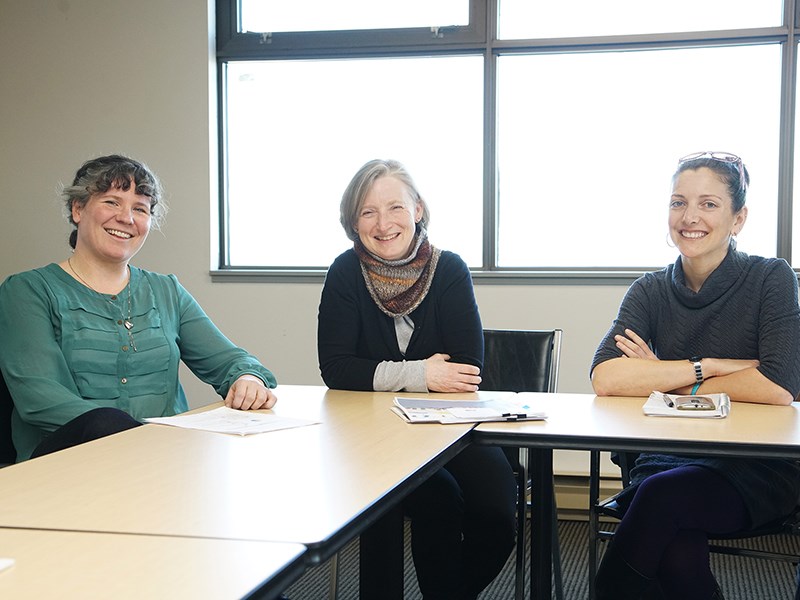Powell River’s availability of childcare spaces falls far short of what is required, a study into the issue has found.
City of Powell River and qathet Regional District partnered in an application to Union of British Columbia Municipalities to secure $50,000 in funding to complete an analysis and inventory of existing childcare services in the region, as well as establishing pathways to the future. An in-depth study has been conducted and is now being finalized in preparation for presentation to the two local governments and the public during an open house session.
The study has been coordinated by regional planner Meriko Kubota, and has involved contractors Janet Newbury and Marlane Christensen, plus input from a number of different sources in the community. Newbury said the project funding was to conduct an inventory of current childcare resources, develop a needs assessment and then develop a 10-year plan.
Rita John, early learning coordinator for School District 47, said a provincial report has just been released and a local report for the last three years has also been released. She said one of the features has been measuring the vulnerability of children in different areas of development.
“Over the years the vulnerability of children has been increasing,” said John. “There has been concern for quite a long time about what is underlying all of those challenges the kids are having.”
Locally, the community is lucky to have a social planner come onboard and start addressing that big, complex issue of what has been happening for families and children, said John. It is addressing the youngest children in the community, she added.
“Putting supports in place that really help families is important,” said John. “If you are supported well when you are young and if you have a healthy zero- to five-year-old time period, the chance of you developing long-term struggles in terms of health and economy are diminished quite remarkably.”
Newbury said the grant funding is specific to the community and solutions are supposed to be specific, but the challenges are national in scope. In terms of the local study, the bulk of research for the Powell River region has involved community engagement.
“We did surveys and focus groups with parents, guardians, childcare providers and students who are going to be childcare providers,” said Newbury. “Through that we were able to get a sense of the local need.”
She added that the childcare planning advisory committee, comprised of parents and guardians, has been helpful in developing all of the tools used so as many people as possible can be reached.
Leni Goggins, a member of the childcare planning advisory committee, said the picture is not good for Powell River. She said there is an estimated 921 quality childcare spaces needed for the regional district area, including Lasqueti and Texada islands.
“That’s a lot of childcare spaces we don’t have; that’s for children ages zero to 12,” she said. “If children aren’t able to access childcare, it has a direct impact on our community. It’s a huge number and I don’t think people realize how limited childcare is here.
“We really are pushing for quality childcare and diverse childcare that can provide for the needs of many different kinds of families.”
Goggins said she is a single parent, works full time and has two children, aged four and eight.
“In particular, for my child who is under the age of five, who isn’t in school, I use six different childcare services to have care for my child five days a week; that includes family, licensed daycare, unlicensed childcare, preschool and myself,” said Goggins. “For me, if these spaces don’t come available, or if one of my childcare providers falls back, then I may not be able to work full time. That has a huge impact on my family. My day-to-day life is a bit of a circus running kids around.”
Newbury said it’s not just about childcare spaces. Other communities have been visited with centres that received funding for childcare but they have wait lists because they can’t hire enough trained workers, she added.
“That’s the other big challenge to this picture, which is also nationwide,” said Newbury.
Childcare workers go to school for two years to get extensive training and then make around $15 to $16 dollars an hour, and are often parents themselves, she added.
Goggins said early childhood educators (ECE) are primarily women and are underpaid because the work of women is not valued.
Four themes have been found in the study process. One is recruiting and retaining workers. Creating new spaces is another. Affordability and accessibility is the third and supporting parents and guardians who want care for children at home is the final component.
“If we can create a plan, which we have strived to do, that looks holistically like that, then we can help to move towards the target for the region,” said Newbury.
A community event to share results of the study will be held on Saturday, March 28. Organizers are inviting anyone interested to the Cedar Room in Powell River Recreation Complex at 11:30 am. There will be presentations for those in attendance about what has been learned and the direction the study is in going from here.
Childminding will be available at the meeting and the session will be followed by a free family swim at 1:30 pm, sponsored by the project.



